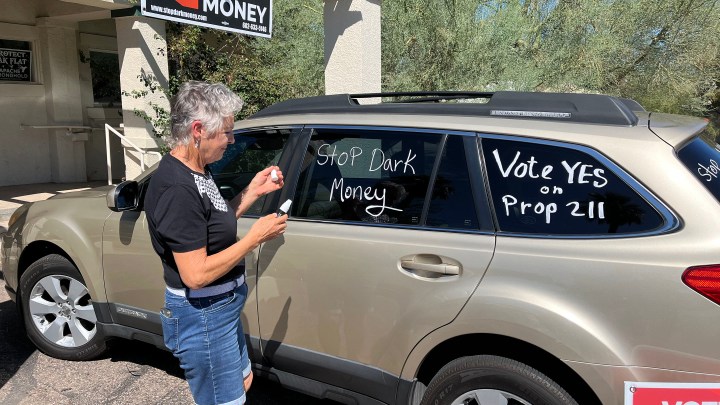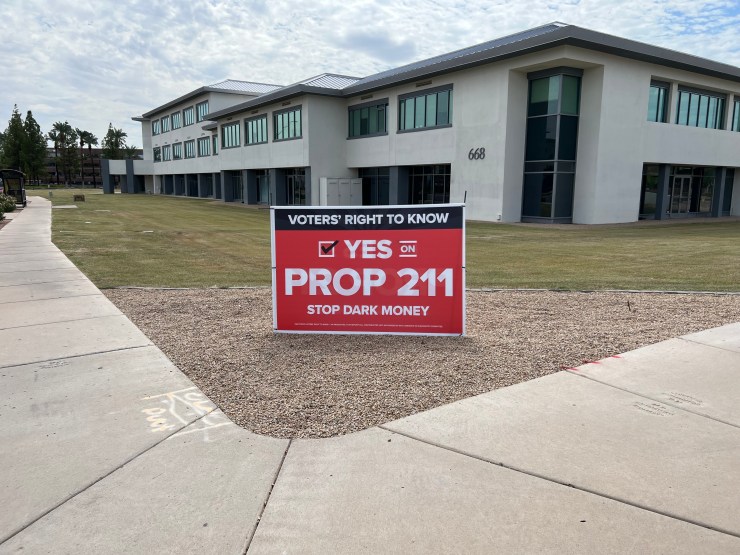
Which states are doing something about “dark money”?
Which states are doing something about “dark money”?

The “Marketplace Morning Report” is running a special series, “Secret Money, Public Influence,” on money, politics and whether campaign donors can be “secret Santas” who spend big but don’t have to disclose it. This election cycle, we traveled to Arizona, where, in a month, voters will decide whether some of the biggest campaign spenders should have to reveal their identities. How this measure got on the ballot, what it hopes to achieve and what opponents say about it provide lessons about the so-called dark money that can sway elections near you.

And it’s not just Arizona that’s doing this. Several other states have gone this route, including Alaska.
Turning back the clock two years, to 2020, campaigning during the COVID-19 pandemic meant rallies not at the state capitol in Juneau, but on computer screens instead. That’s where the group Alaskans for Better Elections had to turn to rally support for Ballot Measure 2, which included provisions for open primaries, ranked-choice voting and increased campaign finance disclosure.
The result was close, but Alaska voters did approve a limit on anonymous money influencing campaigns. If a person gives $2,000 or more, voters get to know who’s paying. That’s now the law in Alaska.
“Every year, every election, more and more money, no one knows where it comes from,” said Scott Kendall, an Alaska attorney now defending the measure in court.
Donors in most states can keep on the down-low by giving their money to a kind of nonprofit that is allowed to do political work. Not a 501(c)(3) like the United Way, which can’t do politics, but typically a 501(c)(4) that’s allowed to give to campaigns. These nonprofits can have pleasant names, along the lines of Citizens for a Perfect Universe or something.
“Americans for Apple Pie, and Americans for Apple Pie donates money in an election and no one knows where that money came from,” Kendall said.
Polls show voters on both and the left and right indicate worry about so-called “dark money.” Republicans got good at it and then in 2020 Democrats got even better at it nationally, according to a New York Times analysis. And Kendall said Alaskans seem to like their new system’s focus on bigger donors.
“If you’re a member of the NRA, you don’t give them $2,000 a year. So the NRA membership, they can donate money,” Kendall said. “Or labor unions — their thresholds are below that.”
Groups including the Alaska Free Market Coalition unsuccessfully challenged the new law in federal court, but it’s now on appeal. Daniel Suhr of the Liberty Justice Center in Chicago represents the challengers. He believes Alaska’s rules go further than advertised, suggesting donors could get exposed if they gave, for example, to the local chamber of commerce. And he’s worried that donors will now be less likely to speak out with their dollars if they could end up in the hot seat.
“Our society benefits when people have that privacy, because it creates space for people to support controversial issues, and have a vibrant marketplace of ideas where all ideas are heard, including controversial ones,” Suhr said.
A robust “marketplace of ideas” is a key reason the U.S. Supreme Court decided not to limit corporate political contributions.
“But, ideally, a market needs transparency in order to function properly,” said Jay Costa, director of a California-based group called Voters’ Right to Know which pushes for disclosure policies at the state level. “Otherwise, there are distortions that occur because people don’t really know what they’re buying.”
How courts decide is being watched well beyond Alaska. In 2018, voters in North Dakota passed new campaign disclosure rules. There’s the one on the ballot in Arizona next month, and maybe Oregon in 2024. Twenty-one states allow votes on measures pushed by citizens and not necessarily referrals from elected legislatures. Patrick Llewellyn is with the Campaign Legal Center, which offers legal expertise in these matters.
“When legislatures won’t take action themselves, it makes sense that citizens of the state would take the initiative,” Llewellyn said.
Last month, President Joe Biden pushed to get money out of what he called “the shadows.”
“Right now, advocacy groups can run ads on issues attacking or supporting a candidate right until Election Day without disclosing who’s paying for that ad,” Biden said in an address.
But, two days later, a national ban on mystery money failed in the Senate. No Republican voted yes and that was that.
David Tedesco, a businessman and registered independent who’s funding the ballot measure in Arizona sees a kind of arms race.
“If you talk to sitting politicians in a private conversation,” Tedesco said, “what you’re generally going to hear from most of them is, ‘I’d like to see dark money go away, but my opponents take dark money, and I might have to take dark money. But privately, if you take care of it for us, I’d be happy to follow those rules.’ ”
Correction (Oct. 14, 2022): A previous version of this story misspelled David Tedesco’s name.
There’s a lot happening in the world. Through it all, Marketplace is here for you.
You rely on Marketplace to break down the world’s events and tell you how it affects you in a fact-based, approachable way. We rely on your financial support to keep making that possible.
Your donation today powers the independent journalism that you rely on. For just $5/month, you can help sustain Marketplace so we can keep reporting on the things that matter to you.


















